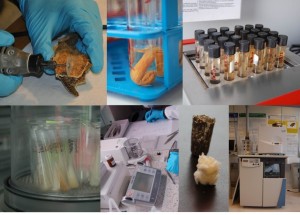Reconstructing the diets of prehistoric humans is fundamental to understand key changes in our evolution and in that of our culture. Analyses of the chemical composition of past body tissues are, in fact, allowing us to gain a deeper understanding of dietary change from the earliest hominins to our latest ancestors. These methods will be discussed, although the talk will focus on the diets of prehistoric humans in the Mediterranean Basin and on the contribution of carbon and nitrogen isotope analyses to this research topic. These investigations show that Mediterranean hunter-gatherers mainly subsisted by exploiting terrestrial mammals and that plant and aquatic proteins had a secondary, or marginal, role in their diet. There were times, however, when short-lived climatic episodes or different environmental conditions made aquatic protein available in higher quantities than at present and humans opportunistically exploited these occurrences. The isotopic evidence has important implications for our knowledge of what hunting and gathering entailed in the Mediterranean and for our understanding of why the diffusion of agro-pastoralism is unlikely to have been resisted by the last hunter-gatherers living around this sea. Isotope data and observations on proto-historic and historic alimentary regimes and on the development of what is commonly known as the “Mediterranean diet’ will also be discussed.
Lecture
The "Mediterranean diet’ in prehistory
Isotopic investigations on hunter-gatherer and agro-pastoral subsistence in Italy
Dr. Marcello A. Mannino

